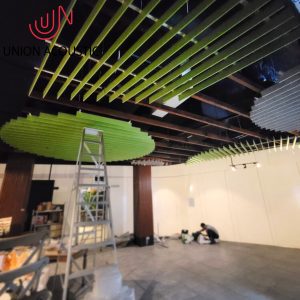
When it comes to creating a productive and comfortable work environment, noise control is key. Excessive noise in the workplace can lead to decreased productivity, increased stress levels, and even hearing damage. One solution to this problem is the installation of sound absorbing panels.
Sound absorbing panels are designed to reduce noise levels and minimize echoes in a room. They are commonly used in recording studios, concert halls, and other spaces where sound quality is essential. However, many businesses across a range of industries have found that sound absorbing panels can also significantly improve the acoustics of their workspaces.
- Offices
Businesses that operate in office spaces can benefit greatly from using sound-absorbing panels to improve their acoustic environment. In today’s open-concept workspaces, the ambient noises can create a challenging acoustic environment that can negatively affect productivity, concentration, and overall employee satisfaction. Installing sound-absorbing panels in offices can help to reduce excessive noise levels by absorbing sound waves and preventing excessive reverberation.
- Restaurants
Restaurants are one of the most common businesses that use sound absorbing panels to enhance their customers’ dining experience. Dining is not only about the food but also the ambiance and atmosphere. Therefore, ensuring that the noise level is moderate is crucial for the satisfaction of the customers. Sound absorbing panels help reduce the amount of noise that reverberates around the room. They can be installed on the ceilings or walls to absorb and dissipate sound waves.
Restaurants that have high ceilings or open floor plans are particularly susceptible to noise build-up, which can create a chaotic and uncomfortable atmosphere for diners. Through the use of sound absorbing panels, restaurant owners not only provide a pleasant dining atmosphere but also show a commitment to customer satisfaction.
- Music Studios
Music studios are one of the most prominent businesses that use sound absorbing panels in their operations. These panels are crucial in ensuring high-quality sound recording, as they help to reduce noise levels and eliminate unwanted echoes and reflections. Acoustic panels can be specially designed to meet the unique needs of music studios. For example, they can be made of materials that are ideal for frequency absorption and diffusion to create a pleasant sound environment.
- Home Theaters
Home theaters have become increasingly popular over the years as people aim to recreate the cinematic experience within their homes. As more individuals seek to create immersive home theaters, businesses that use sound absorbing panels can certainly benefit. Installing sound absorbing panels can effectively reduce echos and noise interference, ultimately enhancing the overall sound quality within the home theater.
Moreover, with the advancement of technology, home theaters have become more accessible to a wider audience, making the installation of sound absorbing panels an essential addition to any home theater setup. The demand for home theaters continues to grow, and businesses that provide sound absorbing panels will be in a prime position to capitalize on this trend.
- Educational Institutions
Educational institutions are one of the major users of sound-absorbing panels, primarily due to the numerous activities that take place within their buildings. These institutions, such as universities, schools, and libraries, require a peaceful environment that fosters learning and concentration. In order to achieve this, they need to manage noise levels by using sound-absorbing panels strategically placed in classrooms, lecture halls, libraries, and other areas where students study and work.
These panels help to absorb excess noise, reduce echos, and control the overall acoustics of the space. By investing in sound-absorbing panels, educational institutions can create a more productive and enjoyable learning environment for their students and faculty. Additionally, they can improve the quality of communication during lectures and presentations, which enhances the overall learning experience.

One Response